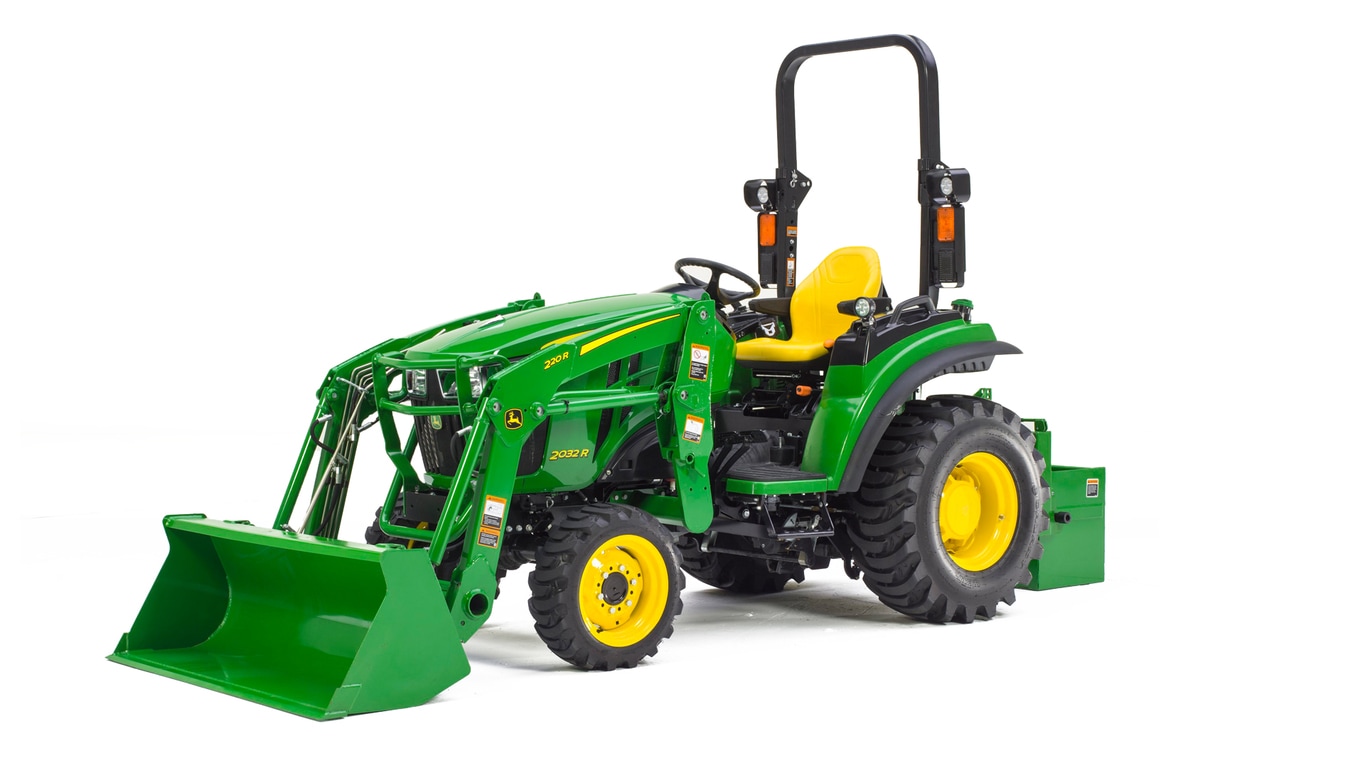Overview
- 31.2 horsepower liquid-cooled diesel engine
- Drive-over mower decks up to 62 inches
- Standard 4WD, cruise control, folding ROPS
- iMatch™ and AutoHitch™ compatible
Features
Features
Powerful, high-torque diesel engine delivers superb efficiency
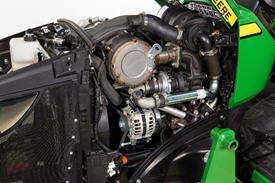 Yanmar 3-cylinder, TNV series diesel engine
Yanmar 3-cylinder, TNV series diesel engine
2032R
The 1.642 L displacement, liquid-cooled 3TNV88C-NJT Yanmar® diesel engine provides 31.2 hp to the 2032R.
Model |
Number of cylinders |
Engine displacement |
Aspiration |
Gross engine hp* |
Gross engine ps* |
PTO hp* |
2032R |
3 |
100 cu. in. (1.642L) |
Natural |
30.7 |
31.2 |
24.2 |
*Engine hp (kW), gross SAE J1995: 31.2 (23) @ 2500 rpm, PS
Displacement, in.3 (L): 100.2 (1.642)
2038R
The 1.568L displacement, turbocharged liquid-cooled 3TNV86T-NJT Yanmar® diesel engine provides 37.3 hp to the 2038R.
Model |
Number of cylinders |
Engine displacement |
Aspiration |
Gross engine hp* |
Gross engine ps* |
PTO hp* |
2038R |
3 |
95.8 cu. in. (1.568L) |
Turbocharged |
36.8 |
37.3 |
30.4 |
*Engine hp (kW), gross SAE J1995: 37.3 (27.4) @ 2500 rpm, PS
Displacement, in.3 (L): 95.8 (1.568L)
The engine uses the latest technologies to optimize fuel economy, improve control and accuracy, and reduce environmental impact.
The common rail system (CRS) optimizes fuel economy and reduces operating costs*. High-pressure injection atomizes fuel into finer particles which burn more completely. It results in improved fuel economy and a lower cost of operation.
The electronic control unit (ECU) provides optimum fuel control and accuracy. ECU monitors and controls the engine. It continuously monitors engine conditions and adjusts the fuel delivery accordingly to ensure optimum performance and emissions.
The engine comes with an after-treatment system. The system operates automatically. The exhaust filter consists of a diesel particulate filter (DPF) which captures particulate matter (PM) contained in the exhaust gas. Using a natural cleaning process, most of the PM trapped in the exhaust filter is eliminated by the heat of the exhaust stream generated by normal use. In situations of low temperature, engine speed or load factor, an active cleaning cycle is initiated. In this cleaning cycle, the exhaust gas temperature is raised by injecting additional fuel during the exhaust stroke of normal vehicle operation to the diesel oxidation catalyst (DOC).
After many hours of use, the exhaust filter may require an ash removal service.
Diesel Oxidation Catalyst (DOC)/Diesel Particulate Filter (DPF)

Depending on the load that the tractor is under, as well as ambient temperature, humidity, and engine speed, the DPF may build up with particulate matter, thus requiring cleaning. Filter cleaning is determined by one of three conditions:
- A prescribed time-based estimation of needed filter cleaning
- DOC/DPF pressure sensors
- A particulate matter buildup estimation based on load conditions
Once one of the three conditions has been met, filter cleaning will occur.
There are three different types of filter cleaning processes:
- Passive filter cleaning
- Active filter cleaning
- Parked filter cleaning
Passive filter cleaning
Passive filter cleaning occurs naturally when the engine is generating enough heat to oxidize particulate matter. This automatic process occurs continuously during normal operating conditions. No tractor icons or symbols appear on the display during passive filter cleaning.
NOTE: Passive filter cleaning requires no operator involvement, and there is no interruption to tractor operation.
Active filter cleaning
If conditions (temperature, load, or speed) for passive filter cleaning cannot be achieved, then particulate matter is removed using active filter cleaner.
To achieve the required conditions, exhaust temperature management (ETM) manages the initiation and duration of active filter cleaning. ETM can adjust numerous engine parameters and/or inject a small quantity of fuel into the exhaust stream for a short duration. The fuel turns to vapor and chemically reacts with the catalysts in the DOC to create heat to oxidize particulate matter.
It is important to note that at no time is fuel in the DOC/DPF ignited, and there is no interruption to tractor operation.
Like passive filter cleaning, active filter cleaning requires no operator involvement, and there is no interruption to tractor operation.
Parked filter cleaning
In some instances where passive and active filter cleaning have not fully cleaned the particulate matter from the system, a parked filter cleaning may need to take place. Most likely, the only time a parked filter cleaning will need to occur is when automatic filter cleaning has been disabled for an extended period of time and multiple warnings to engage filter cleaning were ignored or if the tractor has been used during light load conditions. Additionally, when the automatic filter cleaning process has been deliberately interrupted multiple times, or if active filter cleaning has failed numerous times due to a failed component, a parked filter cleaning may be requested. In these rare instances the operator will have to park the tractor and start the filter cleaning process.
The parked filter cleaning process needs to be activated based on usage and operation of the tractor. The process will take approximately 30 minutes. See operator’s manual for more details.
The emissions system on this engine constantly monitors the soot level of the tractor, making sure the tractor is always in peak performance condition. This ensures high performance at all times.
NOTE: Number of hours since last regeneration and soot level percentage viewable on LCD display.
For more information regarding EPA regulations and the technology behind John Deere Integrated Emissions Control systems, please visit the following link:
http://www.deere.com/wps/dcom/en_US/campaigns/ag_turf/emissions/final_tier_4.page
Yanmar TNV Series engine offers these features:
- Economical cast-in-block cylinder design for good cooling and long life
- Direct fuel injection
- Improves starting
- Injects fuel directly on top of pistons for more efficient combustion
- Develops more horsepower per gallon of fuel than indirect injection engines
- Aluminum alloy pistons are lightweight to reduce connecting rod bearing loads and provide good heat transfer characteristics
- Design permits tighter tolerances and neutralizes expansion of the piston, which reduces blow-by and noise from piston slap
- Top rings are higher on the piston and a thinner head gasket is used to greatly reduce the volume of unburned waste gases and increase combustion efficiency
- Timing gears and injector drive gears have a helical profile to reduce engine noise
- Auto-bleed fuel system
- There is no need to prime the system if the tractor runs out of fuel
- The system will self-prime the injection pump, lines and injectors, providing fast fuel recovery for easier starting
- High-capacity lubrication system provides filtered oil, under pressure, to all engine bearings for long life
- Fuel filter with replaceable element
- Water separator with additional replaceable filter element
- See-through coolant recovery tank permits operator to check coolant level without removing radiator cap
- Dry-type air cleaner with safety element
- Dual element design for added engine protection
- Air cleaner service indicator is standard equipment on all models and alerts the operator on the instrument panels
- Easy access to engine check and fill points on the right-hand side of the tractor by removing the side panels
Easy-to-use hydrostatic transmission (HST) increases productivity
The 2032R and 2038R Tractors are equipped with a two-range hydrostatic transmission (HST) incorporated in a die-cast aluminum transmission case. Fluid under pressure transmits engine power to the drive wheels via a closed-loop pump and motor arrangement. Infinite ground speeds allow the operator to match the speed of the tractor to the job.
- No clutching for fast and easy direction changes
- Twin Touch™ foot pedals for quick and easy forward/reverse operation
- Transmission oil cooler cools transmission oil for longer transmission life
Safety features of the HST transmission include:
- The tractor will only start with the range lever in neutral
- If the range lever is in gear when the key is turned to the start position, the instrument panel instructs the operator to shift to neutral
- The engine will shut off if the operator leaves the seat and the power take-off (PTO) is engaged
Twin Touch foot controls
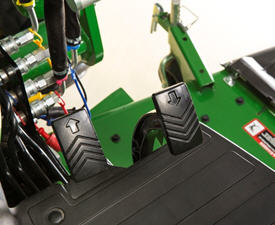 Twin Touch foot controls
Twin Touch foot controls
Key John Deere advantages – John Deere’s Twin Touch foot controls offer several key advantages over competitive HST models tractors.
- Some competitive hydrostatic tractors use a treadle pedal (toe-heel) design foot control for operation of the HST
- Requires the operator to use both toe and heel to change direction, resulting in increased operator fatigue
- The Twin Touch configuration also makes it easier to inch the tractor forward or rearward (i.e., when attaching to implements)
Integrated hydrostatic pump and motor
- Sauer-Danfoss® manufacturer provides the integrated pump and motor; this assures that the components are matched to each other, providing maximum efficiency
- Provides strength and durability needed for operating such attachments as loaders and backhoes
- One reservoir (with one check-point and fill point) for the transmission, differential, and hydraulic system speeds up daily maintenance
- Mechanically actuated by Twin Touch foot pedals allow the operator to select both directions of travel and speed with the touch of a toe
Cruise control
An electronic cruise control is standard equipment on the 2032R and 2038R Tractors. Cruise control is electronically engaged and disengaged using a toggle switch located on the right-hand console.
- Maintains desired forward speed without having to touch the forward pedal
- To disengage the cruise control, either apply pressure to the brake pedal or disengage the cruise control switch
Sauer-Danfoss is a trademark of Sauer-Danfoss Incorporated.
Operator station is comfortable and convenient
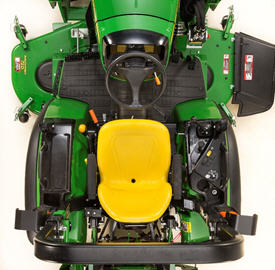 Operator Station
Operator Station
The operator station has been designed to allow for greater operator comfort and increased visibility. The ergonomic layout and convenient color coded controls allow for easy identification and operation. The design of the operator station allows operators to sit “in” as opposed to “on” which provides comfort and increased stability.
Below are other key features of the 2032R and 2038R Tractor operator’s station:
- Sloping hood design provides improved visibility
- Plenty of room for comfortable operation
- Cup holder, multiple storage compartments and a 12V outlet ensures an organized operator station
- Rubberized floor mat design to reduce vibration and noise
- Step-through operator platform makes getting on and off the tractor easy
- Fender-mounted handrails, large and easy to grab, assist the operator when getting on and off the tractor
- Controls have been raised and integrated into the fender for operator comfort and ease of use
- Large, easy to read decals provide clear instructions for experienced and even non experienced operators
- Front horizontal exhaust for increased operator visibility
- If the operator leaves the tractor seat when the transmission, mid PTO, or rear PTO is engaged, the engine will shut down
- For applications where out-of-seat PTO operation is required, the following criteria must be met: transmission in neutral, park brake engaged, and PTO selector set to rear only. See operator's manual for specific instructions.
- Specially designed panels route hot air flow from the engine compartment under the tractor instead of directly onto the operator
Left-side step
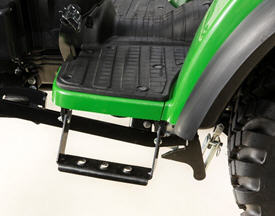 Left-side entrance step
Left-side entrance step
- The left-side step allows for easy access on and off the tractor
- Foot platform has a non-skid surface
Premium seat
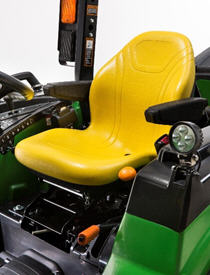 Premium high-back seat
Premium high-back seat
The thick, soft padding on this seat provides a smooth and comfortable ride. A high, scalloped back makes it easier for the operator to turn to view rear implements.
- Seat adjusts fore/aft for operator convenience
- Seat flips forward for protection from the elements
- High seat back and armrests are in base equipment and allow for a more comfortable operation
- Retractable seat belt feature prevent the seat belt from becoming tangled in the seat suspension and controls
Key features of the operator’s station include:
- Tilt steering wheel design in base equipment on the 2032R and 2038R Tractors
- Allows the operator to adjust the steering wheel to the most comfortable position
- Provides additional clearance for the operator to enter and exit the tractor
- Provides easy return to the fully raised position
- Provides plenty of room for comfortable operation
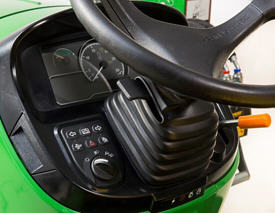 Tilt steering lever
Tilt steering lever
- Easy-fold ROPS allows tractor to be used or stored in low clearance environments
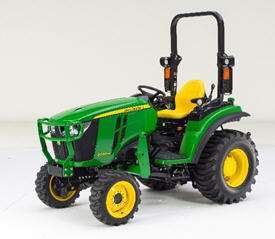
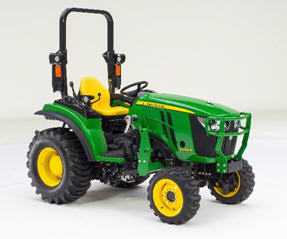
Optional iMatch™ Quick-Hitch feature allows for easy implement hookup
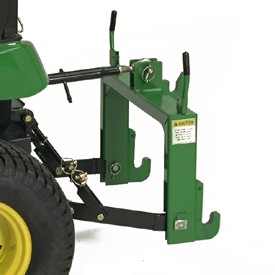 iMatch Quick-Hitch
iMatch Quick-Hitch
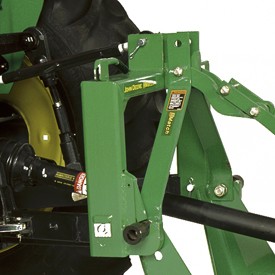 iMatch Quick-Hitch with rotary cutter hookup
iMatch Quick-Hitch with rotary cutter hookup
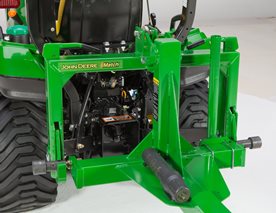 iMatch Quick-Hitch (LVB25976)
iMatch Quick-Hitch (LVB25976)
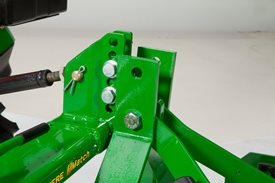 iMatch Quick-Hitch with rotary cutter hookup (LVB25976)
iMatch Quick-Hitch with rotary cutter hookup (LVB25976)
One of the greatest operator concerns involves difficulty in attaching tractor implements. John Deere has addressed this issue with the iMatch Quick-Hitch.
The iMatch Quick-Hitch provides easy hookup and a guaranteed fit for all Category 1 implements that are designed to meet the American Society of Agricultural and Biological Engineers (ASABE) Category 1 Standard S278.6 for quick-attach hitches.
- All implements require a set of bushings in order for the attachment to fit and work properly with the iMatch Quick-Hitch. One set of bushings comes with the iMatch Quick-Hitch.
NOTE: The bushing set can be seen in the picture above. These bushings allow the hooks on the iMatch and the pins on the implement to fit together properly. All other implements (box blades, tillers, rear blades, etc.) will require a set of bushings to enlarge the pin to fit with the iMatch hooks. Bushings of different lengths can be found in the parts system or through a bushing supplier (see dimensions below).
- Upper bushing
- Inside diameter: 1.93-1.95 cm (0.76-0.77 in.)
- Outside diameter: 3.15-3.18 cm (1.24-1.25 in.)
- Lower bushings
- Inside diameter: 2.24-2.26 cm (0.88 to 0.89 in.)
- Outside diameter: 3.63-3.66 cm (1.43 to 1.44 in.)
CommandCut™ controls allows quick and accurate height of cut adjustments
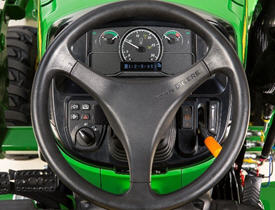 New designed instrument panel
New designed instrument panel
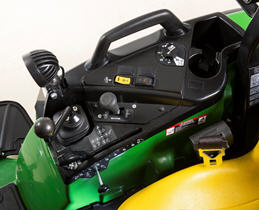 CommandCut™ controls
CommandCut™ controls
The 2032R and 2038R tractors feature a newly designed, CommandCut™ mower deck lift system, which allows quick and accurate adjustments of the mower deck with the turn of a dial and the bump of a lever. Control callouts make operation simple and repeatable. The height of cut setting dial and raise/lower lever are conveniently located on the right-hand console and easily accessible by the operator. Some of the key benefits of this system are:
- Installing CommandCut™ only requires a simple calibration after installation. It is a true “plug-and-play” system as no controller programming is required.
- Inhibits PTO operation when mower deck is in the install position to prevent PTO driveling and mower deck blade damage
- Eliminates the need for hydraulic power and components, thus dedicating all hydraulic capacity to other implements or tract functions
- Fewer hydraulic components means fewer hydraulic leaks, especially when working on sensitive turf
- Precise height of cut with no drift or leakdown
- System can be calibrated to different tire sizes to maintain precision
- Minimum effort required to set height of cut and to raise/lower the mower deck which reduces operator fatigue
- Easy to read graphical interface on the instrument panel allows operator to glance at the desired height of cut while staying focused on mowing
- Built in transport lock can be activated from the seat by turning the height of cut dial to position 6 and raising the deck to the highest position
Excellent serviceability and diagnostics reduce operational cost and improves productivity
Regular service and maintenance are essential to the performance, productivity, and longevity of the tractor.
- Tractors are equipped with extensive onboard self-diagnostic capabilities and are fully compatible with the John Deere-exclusive ServiceADVISOR™ system.

- Four quarter turn fasteners allow operators to easily remove the engine side panels without tools to access to the engine compartment.
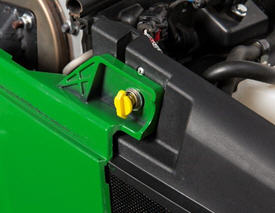 Quarter turn fasteners
Quarter turn fasteners
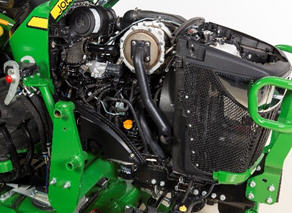 Right tractor side panel removed
Right tractor side panel removed
- Easy access to regular service points minimizes service time
- Daily service checks, such as checking the engine oil or water separator, can be done without opening the hood or removing the tractor side panels
- Tractors are equipped with an electronic air filter restriction indicator that alerts the operator when the air filter needs to be cleaned or changed
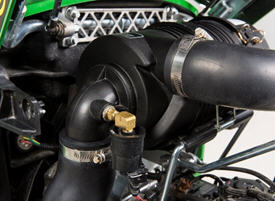 Air filter restriction sensor
Air filter restriction sensor
- Daily service requirements are minimal and simple to accomplish. Most service interval requirements can be performed with a basic understanding of procedures and common tools.
- All external engine, fuel and transmission filters are easily accessible
- Increased service intervals lessen overall cost of ownership
- Hydraulic oil service interval increased to 1200 hours when using Hy-Gard™ products
- Hydraulic oil filter will need to be changed every 400 hours
- Fuel tank is located on the rear of the tractor to allow for easy access when fueling
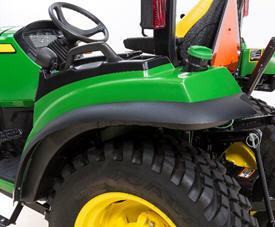 Fuel Tank
Fuel Tank
- Gas-lift hood support eliminates the need for a mechanical prop rod
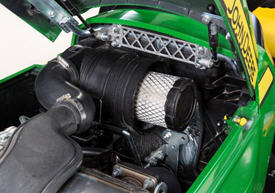 Gas-lift hood shocks
Gas-lift hood shocks
All items in the daily service schedule can be performed without the use of tools:
- Engine oil, hydraulic oil, coolant level, and the water separator can be conveniently accessed
- The engine can be easily accessed by simply raising the hood for more periodic maintenance checks
NOTE: Always refer to the operator’s manual for complete maintenance and service recommendations.
Increase productivity with standard eThrottle feature
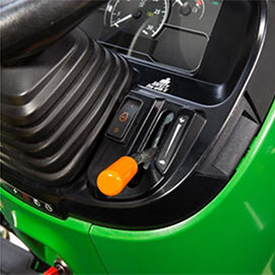 eThrottle switch
eThrottle switch
The 2032R and 2038R Tractors come equipped with the eThrottle feature. This feature is designed to make the tractor quieter and use less fuel. With eThrottle engaged, the engine rpm and transmission speed will increase as the Twin Touch™ pedals are depressed. This feature can be beneficial for use in many different applications, especially for front loader work and when transporting on roads or in parking lots.
To enable the system, producers press the switch located on the right side of the front console. Once the system is enabled, engine speed will then increase or decrease in unison as the Twin Touch transmission pedals are depressed.
For loader work, producers will get maximum benefit from the system by increasing engine rpm with the hand throttle to at least 50 percent. Once the hand throttle is set, eThrottle will help provide the feeling of a power boost when the producer is filling the bucket with material from a pile. The harder the Twin Touch pedal is pressed, the more engine speed available. In this scenario, as the producer presses the pedal, the engine will operate between 50 percent throttle and 100 percent throttle. It will not go below 50 percent until the hand throttle is lowered back down.
For transport applications, it is recommended to engage eThrottle but leave the hand throttle set to low idle so that eThrottle can control the entire range of engine speed from 0 percent up to 100 percent.
In power take-off (PTO) applications such as mowing or snow blowing, eThrottle is not recommended because PTO implements usually require a constant speed in order to properly function.

